The Best Harmonicas for Blues - Top Blues Harps
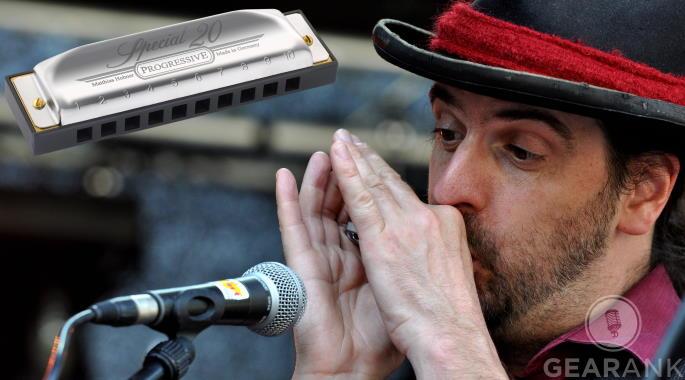
Author & Contributors
Alexander Briones
I have been writing about and researching music gear for many years, all while serving as a music director at my local church. I engage in guitar playing and singer-songwriter stints, in addition to mentoring young musicians and teaching guitar and bass.
Small Fish Diatonic Harmonica
This is a beginner-friendly harmonica that you can get at a very affordable price, ideal for those who want to test the waters without having to spend too much.
It is similarly spec'ed to harmonicas that are priced higher, with 10 holes, 20 brass reed plates, and stainless steel covering.
Interestingly, it is slightly longer compared to the usual 4" length.
Specifications
- Type: Diatonic
- Tuning: Richter
- Number of holes: 10
- Reeds: 20
- Cover plates: Stainless Steel
- Reed plates: Brass
- Reed plate surface: Brass
- Mouthpiece surface: ABS
- Comb: ABS
- Length: 5 in
Pros
Reviewers mention that kids enjoy playing with the Small Fish Diatonic Harmonica, describing it as a budget-friendly way to inspire kids to make music. Experienced musicians appreciate how easy it is to use, and the overall value that it brings given its price tag. Being easy to store is another positive trait that it gets commended for in reviews.
Cons
On the flipside, there are some users who caution that it requires a bit more air and effort to use.
Overall
With its affordable price and high ratings, the Small Fish Diatonic is a good way to get into harmonica playing.
Fender Blues Deluxe Harmonica
The Fender Blues Deluxe Harmonica is another proof of Fender's success outside their usual market - which is guitars and related gear.
This particular harmonica is meant as an entry level option, with an affordable price tag that will easily appeal to beginners.
As the label implies, this one is meant for Blues style players, with its 10-hole diatonic design.
It has chrome metal covers, brass reeds and ABS plastic combs that work together to provide a distinctly bright voicing.
Specifications
- Type: Diatonic
- Tuning: Richter
- Number of holes: 10
- Reeds: 20
- Cover plates: Chrome Metal
- Reed plates: Brass (Replaceable)
- Reed plate surface: Brass
- Mouthpiece surface: Not Specified
- Comb: ABS
- Length: Not Specified
Pros
Most owners describe this as fun to play beater harp, impressing even experienced musicians with its intonation and easy playability. Reviews are also full of beginners who enjoyed learning with it. Users are satisfied with its sound, some even comparing it to more expensive harmonicas. Value for money continues to be its main strength, given its big brand backing, specs and sound quality.
Cons
There are some experienced users who complain that they have to adjust their technique because of the position of the cover plates.
Overall
With its Fender brand backing and good market feedback, it is hard to go wrong with this affordable harmonica.
Eastar Major Blues Diatonic Harmonica
The Eastar Major Blues Diatonic Harmonica's main distinguishing feature is its colorful finish, which include eye candy colors like purple and pink. This colorful design helps it appeal to younger harmonicists.
It doesn't stray too far from conventional 10-hole harmonica designs, and the same can be said with its tonality.
Other noteworthy features include the use of ABS on the edges to make the harmonica easier on the hands, a 1mm thick brass base, and it comes with matching colored cases.
Specifications
- Type: Diatonic
- Tuning: Richter
- Number of holes: 10
- Reeds: 20
- Cover plates: Silver
- Reed plates: 1 mm Brass
- Reed plate surface: Brass
- Mouthpiece surface: ABS
- Comb: ABS
- Length: 4.7 in
Pros
Its colorful design helps to get kids interested, hence the reason why many consider this as a good buy for youngsters. It also helps that it sounds good for the price, as attested to by beginners and experienced musicians alike. Reliability is another major reason why many rate this highly, with reports of it still working fine even after being dropped multiple times.
Cons
Speaking of dropping, there are a few reports of it breaking apart due to loose screws, it is recommended that you regularly check and tighten the screws as needed. There are also a few complaints about the quality of the included case.
Overall
If you're looking for a colorful harmonica, or if you're looking for one that will appeal to younger musicians, then this should be high in your list.
East Top Blues 008K Diatonic Harmonica
At 4" in length, the compact profile of this harmonica makes it easy to store in pockets, and it does so while retaining all the features you'd expect from a 10-hole harp.
Even with its smaller size, East Top was able to fit 1.2mm thick phosphor reed plates, resulting in a sound that's still similar to its regular sized counterparts.
It has stainless steel cover plates which come in different colors: Blue, Silver and Black.
It also features food-grade ABS plastic comb that's sturdy yet safe to use.
Specifications
- Type: Diatonic
- Tuning: Richter
- Number of holes: 10
- Reeds: 20
- Cover plates: Stainless Steel
- Reed plates: 1.2mm Phosphor Bronze
- Reed plate surface: Phosphor Bronze
- Mouthpiece surface: Not Specified
- Comb: ABS
- Length: 4 in
Pros
Owners of the East Top Blues 008K have plenty of good things to say, most of which commend its overall build quality. Many are also impressed with how good it sounds given its more compact profile, while experienced harpists appreciate how it can handle advanced techniques. While it's not as affordable as entry-level harmonicas, it still gets a lot of thumbs up for its quality per price ratio, some experienced owners even like it better than more expensive alternatives.
Cons
There are some who aren't too impressed with its tone without clearly stating why. There are a few reports of reeds clogging or breaking earlier than expected.
Overall
The East Top Blues 008K is a great pick if you're looking for a pocket and wallet friendly harmonica.
Hohner Marine Band 1896
The Marine Band 1896 is one of the original blues harps designed by Hohner and has been a staple ever since.
Since its patent in 1896, it has been played by world-renowned musicians, such as John Lennon, Bruce Springsteen and Neil Young. To this day it is still being used by many professional harmonica players around the world, including bands like Walk Off the Earth.
It is well loved for its full tone, patented stainless steel covers, and its wooden comb.
Specifications
- Type: Diatonic
- Tuning: Richter (Harmonic Minor and Natural Minor also available)
- Number of holes: 10
- Reeds: 20 Brass
- Cover plates: Stainless steel
- Reed plates: 0.9 mm brass
- Reed plate surface: Brass
- Mouthpiece surface: Pearwood lacquered
- Comb: Pearwood, brown
- Length: 3.9 in
Pros
Being expressive and easy to play are the main reasons why many rate the Marine Band 1896 highly. Many report dramatic improvement in playing experience when comparing with cheaper alternatives, while others report that it helped them level-up their harping skills. The sound is described as bright and rich, and continues to be the favorite of professionals who play blues, rock and country songs. Build quality and reliability are also often commended.
Cons
Since it has a wooden comb, the downside for this is that it swells when it gets moisture and it may cause lip injury after long periods of time. It takes a bit more effort when it comes to taking it apart for cleaning and tuning, but with proper care, it's built to be durable and long lasting. Many users mentioned the holes were smaller and its built-in wooden comb were stiffer compared to other harmonicas they have tried.
Overall
Overall, this is a great choice for intermediate and professional players.
Hohner Special 20
At the time of its release, many found the Hohner Special 20 to be comfortable to play, thanks to its unique recessed reed plates.
This design has since inspired other manufacturers to model their 10-hole harmonicas in a similar fashion.
The recessed reed plates and airtight design allow for faster sound production. Its comb is made of plastic, which is durable since it doesn't absorb any moisture, while its classic reeds and tuning provides great response and rich tone.
Its lasting legacy includes a long list of performances and recordings by music industry veterans such as Bob Dylan, and John Popper of The Blues Traveler Band.
Specifications
- Type: Diatonic
- Tuning: Richter/Country
- Number of holes: 10
- Reeds: 20 Brass
- Cover plates: Stainless Steel
- Reed plates: 0.9 mm brass
- Reed plate surface: Brass
- Mouthpiece surface: ABS
- Comb: ABS, black
- Length: 4 in
Pros
As expected from an industry standard harp, amateurs and professionals alike rave about how well made it is. It's sturdy plastic comb with recessed reed plates are what makes it comfortable to play as well as easy to clean and maintain. Since its plastic comb is less prone to moisture, it's less likely to wear and tear after long periods of time.
Cons
Although it is reported by some beginners drawing on some of the holes were a bit challenging for them, many of them still find it easy to use when it comes to bending techniques.
Overall
At a reasonable price point, this harmonica is an exceptional choice for both professionals and beginners alike.
Things to Consider When Buying Harmonicas for Blues
-
It's recommended for beginners and for blues players to start with diatonic harmonicas. They come with 10 holes and are tuned to a major or minor scale of specific key. For example, if it's tuned to the key of G, it will only play the G major scale. Although you can play blues on a chromatic harmonica, diatonic harmonicas are a befitting choice for playing blues, country and folk because of the additional drawing and bending techniques needed to produce that "bluesy" sound, and the missing notes from the scale.
-
As mentioned above, harmonicas are tuned to a specific key. It’s best to get a harmonica tuned to the key of C if you’re just starting out. You’ll be able to play up to 3 octaves on a C major scale. Many of the songs you will learn are also tuned to the key of C. Most blues harmonicas are played in what's called a "second position" or also known as a "cross harp". This means playing the harmonica tuned to a perfect fourth below the original key of the written music by using the 2 draw hole as a root note instead of using the 4 blow hole used for the first position and original key. If the music is written in G, then a C harmonica is used in the second position. This is the most common position used for playing blues.
-
-
Comb Material
Choosing a comb material matters more in terms of maintenance. There are four kinds of materials produced: wood, plastic (ABS), plexiglass and metal. For beginners, it's best to go with plastic since it's easy to maintain and is comfortable on the lips. Metal combs are also another option that's less prone to wear and tear due to screws, though they are a bit more expensive. Wood is also another common material produced and they are much more prone to moisture, which can cause swelling and may leave cuts in your mouth while playing the harmonica, yet some people say that they give a much "warmer" sound and don't mind the efforts of maintaining it.
-
Cover
The cover of the harmonica is what creates the acoustics. It all depends on what type of sound you are going for when it comes to choosing the type of cover design. A lot of affordable to mid-range priced harmonicas have traditional covers where the back of the cover is more open producing a bright and clear tone. Another type is the cover-all design, which slightly muffles the harmonica, but resonates it more to produce a full, warm, and mellow tone. Metal covers produce a brighter sound while plastic produces a much softer sound.
-
-
The quality of the harmonica is usually on par with the price, especially with ones that are well built with high-grade materials. If you're a hobbyist, a budget option would suffice. If you are serious about learning, it's more difficult to learn on a cheap harmonica since its poorer construction causes air to leak out making them hard to play. So if you want to seriously incorporate the harmonica in your music, it's best to invest in harmonicas that are within the $30 - $65 price range.
Type of Harmonica
Which Key to Get
Construction
Price
Best Blues Harmonica Selection Methodology
The first edition was published in 2017.
Because a particular model of a blues harmonica comes in several different keys, we decided to take the approach of only rating ones in the Key of C because the ratings are similar across the different key versions of a particular blues harp. This means you can use our guide to decide on a model you like and then buy it in any key you want. Once we had established this approach we looked at the models available from major music gear retailers in the USA and placed 25 diatonic harmonicas on our short-list for closer examination - you can see them all in the Music Gear Database.
We then gathered feedback and reviews about each harmonica, we got this from online retailers, forums, blogs and music gear review websites and videos. For this edition, we analyzed over 40,800 sources that we used for the Gearank Algorithm to produce our rating scores out of 100 for each harmonica. We then used those results to select the highest rated options to recommend above. We also used those review sources to report on what musicians say about each model we recommended. For more information about our methods see How Gearank Works.
About the Author and Contributors
Here are the key people and sources involved in this guide's production - click on linked names for information about their music industry backgrounds.
Lead Author & Researcher
Alexander Briones
I have been writing about and researching music gear for many years, all while serving as a music director at my local church. I engage in guitar playing and singer-songwriter stints, in addition to mentoring young musicians and teaching guitar and bass.
Drawing from his experience in performing and recording, he teaches guitar and bass and mentors young artists to be better musicians. And when he is not busy playing or tinkering with musical gear, he puts on his entrepreneurial hat, which helps fund his passion for collecting guitars, mecha figures and Gunpla kits.
Contributors
Denise Azucena: Supplemental writing.
Jason Horton: Editing and Illustrating.
Media
Main/Top Image: Original photograph by Ralf Schulze and modified by Gearank.com under a Creative Commons 2.0 license.
The videos above have been embedded in accordance with YouTube's Terms of Service.
The individual product images were sourced from websites, promotional materials or supporting documentation provided by their respective manufacturers.



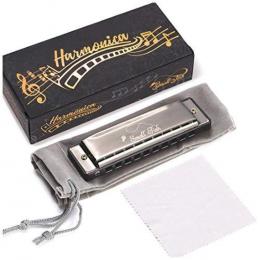
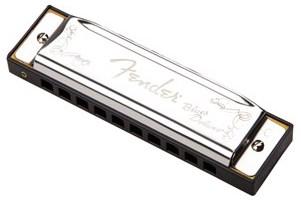
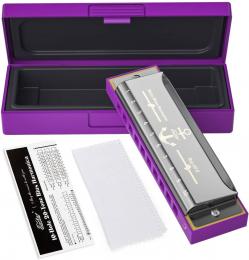
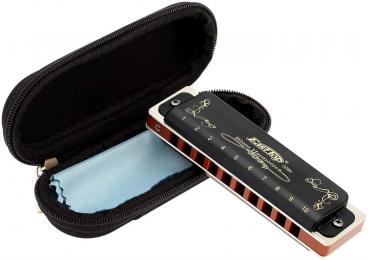
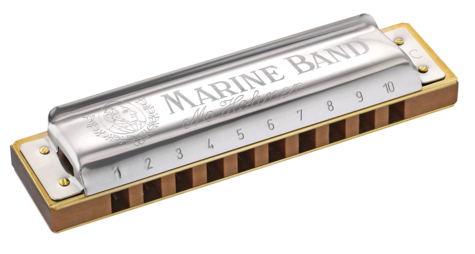
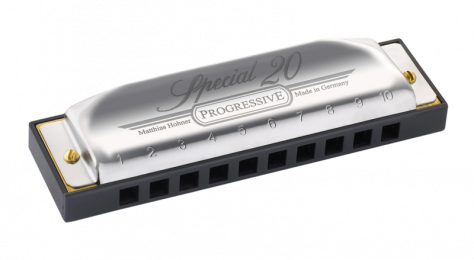
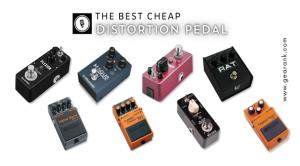
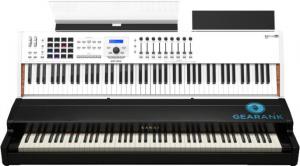
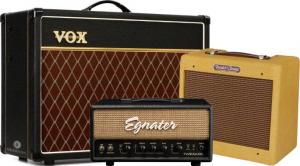
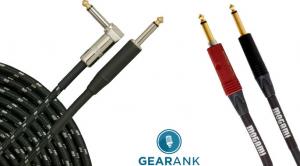
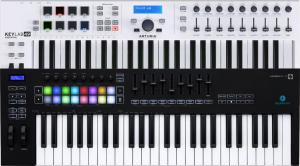
Comments
Our January 2021 update
Submitted by Jason Horton on
Our January 2021 update resulted in the following harmonicas coming off our recommended list above:
As a result of our January
Submitted by Jason Horton on
As a result of our January 2020 update the following harmonicas came off our recommended list above but you can still see our analysis of them:
I've tried all the major
Submitted by Anonymous (not verified) on
I've tried all the major brands in the past year, having gotten serious about getting better in early 2018. I now own 57 harps, and I like the 3 Lee Oskar minor key and 2 major key harps I have pretty well. I feel the same about several Hohner Special 20s I'm pretty happy with. I don't like the feel of the Marine Band on my tongue when tongue blocking. My favorite Hohner is the Crossover; it has a smoother lacquered wood comb, costs $30 more, and has a bluesier sound that's worth it to me. I love the feel and sound of several of my even more expensive Seydel 1847 Blues Silver (white comb--$90) and 1847 Blues Noble (black comb--$110) harps, except for an A harp that has balky reeds in holes 2 and 3. I've had this issue with almost every A harp I've bought, except a Lee Oscar I recently bought. I've been disappointed with several Seydel Session Steels, which have an orange comb, feels nice and smooth, but often has balky reeds in holes 2 and 3 that are harder to get a decent sound from even for my F and G harps. I love my Suzuki chromatic 48, and have been fairly happy with my Suzuki Low D, Low F, and tremolos (C and Am). I haven't tried regular key diatonic Suzukis due to reading some negative reviews about their playability--that's hearsay though, so I can't be critical without firsthand experience with them. I should get one or two and try them, I guess.
Seydel 1847 classic are my
Submitted by Patrick Clark (not verified) on
Seydel 1847 classic are my favorite. I have a few Suzuki Manji, and several Hohners like marine band deluxe, special 20,and rocket. I've heard that Lee Oscar's are not a good harmonica especially for bending if you're a beginner. If I had to recommend a good, decent priced harmonica for someone starting out I'd recommend a Hohner marine band or special 20. The marine band has a wood comb and the sp20 has a plastic one. Once you progress or can afford to spend a few more dollars on a good quality harmonica I'd say a Seydel 1847 classic, or Hohner crossover.